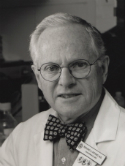Suberoylanilide hydroxamic acid (SAHA), a histone deacetylase inhibitor, suppresses the growth of carcinogen-induced mammary tumors Journal Article
| Authors: | Cohen, L. A.; Marks, P. A.; Rifkind, R. A.; Amin, S.; Desai, D.; Pittman, B.; Richon, V. M. |
| Article Title: | Suberoylanilide hydroxamic acid (SAHA), a histone deacetylase inhibitor, suppresses the growth of carcinogen-induced mammary tumors |
| Abstract: | Suberoylanilide hydroxamic acid (SARA), a histone deacetylase inhibitor, has been shown to inhibit the development of N-methylnitrosourea (NMU)-induced rat mammary tumors when fed in the diet continuously for the duration of the carcinogenic process. The present study was designed to determine whether the inhibitory effects of SARA occur during the initiation process or at subsequent stages in the carcinogenic process. In addition, animals with established NMU tumors were administered SARA to determine whether SARA could inhibit the continued growth of established mammary tumors. It was found that SARA fed at 900 ppm in the diet inhibited tumor yields when administered from 14 days prior to NMU administration to termination (-14 to +130) and from +14 and +28 days to termination. However, SARA had no effect on tumor yields when administered from -14 to +14 or from -14 to +50 days and then returned to the control diets for the remainder of the experimental period (130 days). These results indicate that the inhibitory effects of SARA are not exerted at the initiation phase of NMU-induced mammary tumorigenesis and appear, instead, to inhibit the subsequent stages in tumor development. Of most interest was the ability of SARA to inhibit the growth of established mammary tumors. Administration of SARA in the diet at 900 ppm resulted in significant inhibition of established tumor growth. Thirty-two percent of SARA-treated tumors exhibited partial regression compared to 12% of controls, growth was stabilized in 24% of treated tumors compared to 12% of controls while 11% exhibited complete regression compared to 0% of controls. Collectively, SARA-treated tumors exhibited a 7-fold reduction in growth compared to untreated tumors over the test period. The results of this animal model study indicate that SARA, when fed in the diet, serves as both a chemopreventive and chemotherapeutic agent in the absence of any detectable side effects. |
| Keywords: | dna; histone; transcription; rats; acetylation; mechanisms; agent; transformed-cell differentiation; cancer; suberoylanilide hydroxamic acid (sara); mammary tumor; deacetylase (hdac) inhibitor |
| Journal Title: | Anticancer Research |
| Volume: | 22 |
| Issue: | 3 |
| ISSN: | 0250-7005 |
| Publisher: | International Institute of Anticancer Research |
| Date Published: | 2002-05-01 |
| Start Page: | 1497 |
| End Page: | 1504 |
| Language: | English |
| ACCESSION: | WOS:000177246500020 |
| PROVIDER: | wos |
| PUBMED: | 12168829 |
| Notes: | Article -- Source: Wos |
Citation Impact
Related MSK Work





